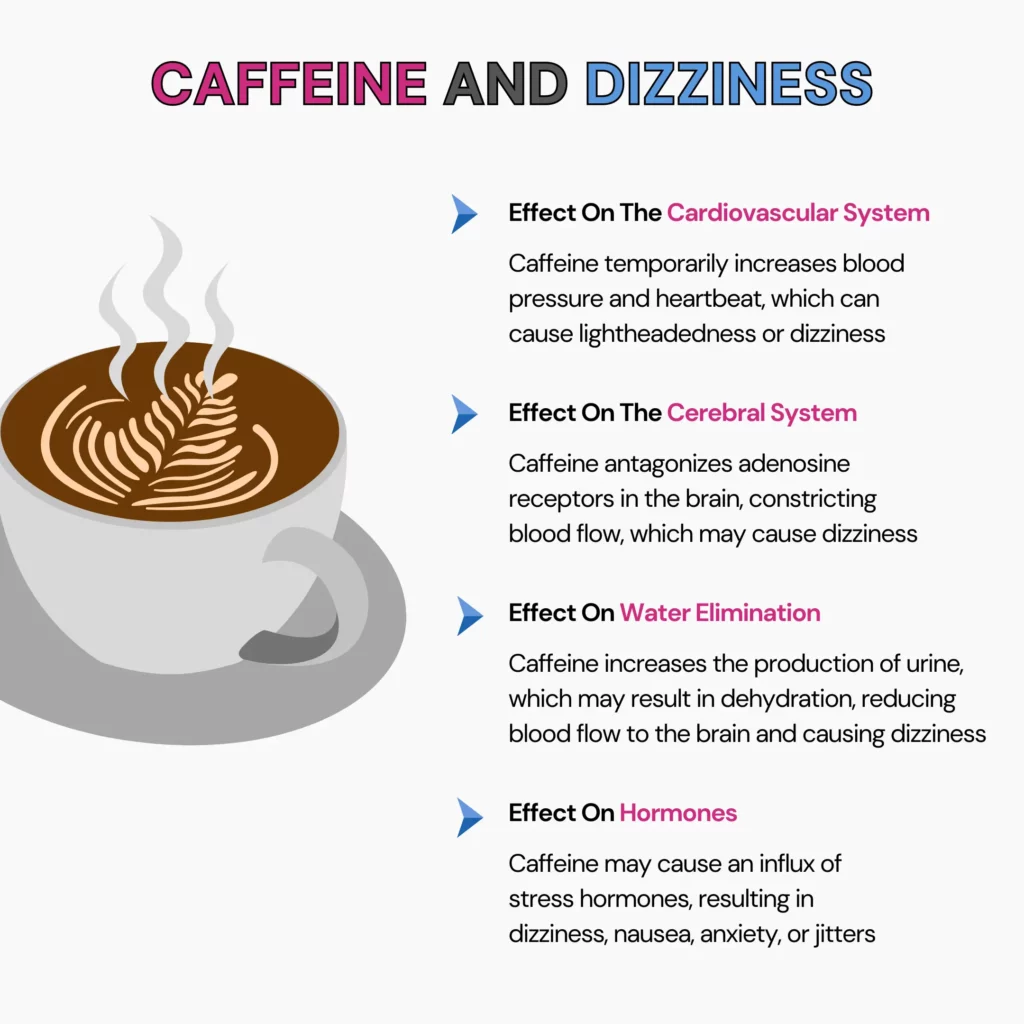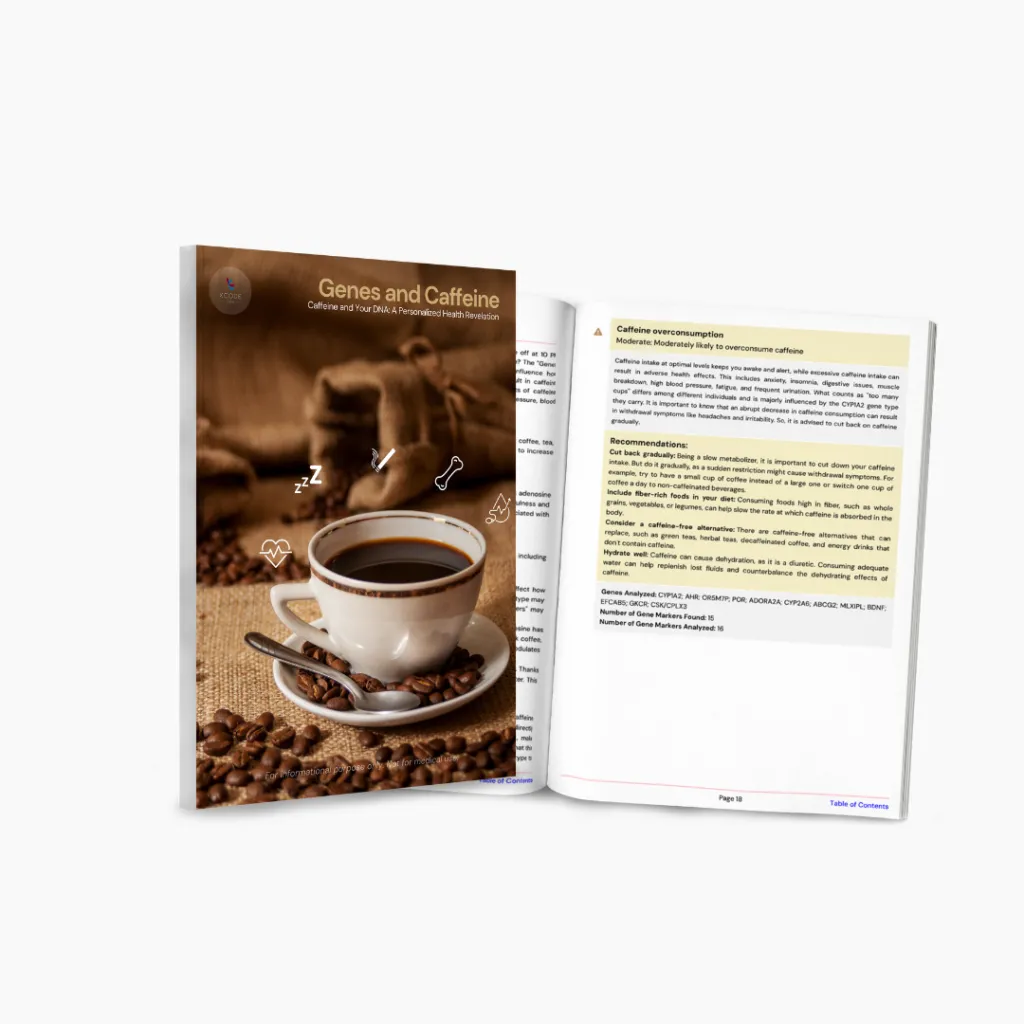While for some, not going a day without coffee can cause headaches and dizziness, for a few others, ironically, consuming coffee can cause dizziness. Interesting right? Among other things, our genes play an important role in how our body responds to caffeine - whether it may benefit or harm your health. This article discusses how caffeine may cause dizziness and offers an in-depth guide to how you can moderate your caffeine intake according to your genetic type.
Why Does Caffeine Cause Dizziness?
Caffeine is a CNS (central nervous system) stimulant, making us feel energetic and less sleepy upon consumption.
To facilitate this, caffeine does several things to the body:
- Blocks the effects of adenosine (a chemical that makes you feel sleepy) in the brain
- Releases noradrenaline and norepinephrine, which can temporarily increase heart rate and blood pressure
- Has diuretic effects (increased urine excretion)
- Slightly influences a rise in core body temperature as it mediates alertness
Here are a few ways by which caffeine might lead to dizziness:

Caffeine's Effect On The Cardiovascular System
One major pathway by which caffeine can mediate the dizziness effect includes its effect on the cardiovascular system.
Caffeine intake increases blood pressure and heartbeat.
This causes changes in blood flow throughout the body, especially to the brain, which can cause lightheadedness or dizziness.
Caffeine's Effect On The Cerebral Systems
Caffeine antagonizes adenosine receptors in the brain, constricting blood flow.
This may cause some people to experience dizziness when caffeine is consumed.
Caffeine’s Dehydrating Effect
Caffeine has a diuretic effect, which increases the production of urine.
Dehydration causes a pressure drop in the body, which reduces blood flow to the brain and may cause dizziness.
Caffeine's Effect On Hormones
Caffeine intake may cause hormonal influx for stress responses, resulting in undesirable side effects like dizziness, nausea, anxiety, and jitters.
Bottomline: Can Caffeine Cause Dizziness?
Caffeine can affect the cardiovascular system, cerebral blood flow, water elimination, and stress hormone levels. These factors can lead to increased heart rate, blood pressure changes, and reduced brain blood flow, triggering lightheadedness or dizziness.
Why Does Caffeine Make My Head Feel Weird?
Caffeine As A Cause
Caffeine can make us awake and alert as a stimulant, but it can either narrow or swell blood vessels in the brain.
The latter might result in inflammation, which can also expand to nearby tissues, triggering headaches.
Caffeine can also lead to dehydration, which can also be a reason for lightheadedness.
Caffeine Withdrawal As A Cause
People addicted to caffeine find it challenging to cut down on caffeine.
When a person stops or cuts consuming caffeine then, the very first symptom of caffeine withdrawal is a headache.
Other symptoms, such as tiredness, irritability, and difficulty concentrating, usually accompany caffeine withdrawal headaches.
How Much Caffeine Is Too Much?
The FDA has recommended 400 milligrams per day for healthy adults, and it is not associated with any dangerous or adverse effects.
However, this varies with people and how fast they metabolize it when consumed.
Pregnant women should limit their daily caffeine intake to 200 milligrams or less.
Caffeine Sensitivity: What Is It?
Caffeine sensitivity is the degree to which an individual reacts upon caffeine intake.
It varies with person and is influenced by factors like genes, metabolism, age, sex, and the frequency of consumption.
| Metabolizer Types | Recommended Caffeine Intake Per Day |
| Slow metabolizer | 100 mg or up to 1 cup of coffee |
| Moderate metabolizer | 200 mg or up to 2 cups of coffee |
| Fast metabolizer | 400 mg or up to 4 cups of coffee |
Symptoms Of Caffeine Sensitivity
People with caffeine sensitivity can metabolize caffeine more slowly than normal people as the adrenaline rushes immediately when they consume it.
Symptoms of consuming higher amounts of caffeine may include:
- Difficulty in falling asleep
- Increased anxiety or nervousness
- Increased heart rate
- Stomach issues or gastrointestinal discomfort
- Migraines
- Elevated blood pressure
Caffeine And Health: Other Side Effects Of Too Much Caffeine
Symptoms Of Too Much Caffeine
Consuming too much caffeine can result in
- Headache
- Jitters
- Anxiety
- Increased heart rate
- Stomach upset
- Vomiting
- Insomnia
- A feeling of unhappiness (dysphoria)

Genes And Caffeine Report
A personalized guide on your body’s relationship with caffeine. Learn if your risk for various health and wellness traits directly linked to caffeine.
Accepted raw data formats: 23andMe, Ancestry DNA, Family Tree DNA, Living DNA, MyHeritage DNA and more.
5 Best Tips To Get Rid Of Caffeine Dizziness
Stay hydrated: Drinking plenty of water can flush out caffeine and neutralize the diuretic effect of caffeine.
Reduce your caffeine intake: Gradually reduce caffeine intake without an immediate stop.
Try alternatives: Caffeine-containing foods can be replaced with noncaffeinated foods, or if they can’t be avoided, try a darker roast, which contains less caffeine.
Physical movements: Exercising can improve caffeine-induced dizziness. Involving HIIT workouts is not necessary. However, slow movements like yoga or breathing exercises may also help with dizziness.
Eat fiber-rich foods: Fibres can slow down your caffeine absorption. Including fiber-rich foods can help reduce caffeine-induced dizziness.
Summary: Can Caffeine Cause Dizziness?
Caffeine can cause dizziness either by blocking adenosine receptors, or by increasing heart rate, or as a diuretic agent, which leads to dehydration
In addition to its effects on the cardiovascular and cerebral systems, sensation also includes an individual’s sensitivity and hormonal fluctuations
Caffeine can make your head feel weird due to its potential to cause dehydration and withdrawal symptoms
The FDA has recommended a maximum of 400 milligrams of caffeine per day for healthy adults, which also reduces slow metabolizers and pregnant women
Managing caffeine dizziness involves staying hydrated, reducing intake, choosing alternatives, engaging in physical activity, and eating fiber-rich foods
Others Are Also Reading

Can Lack Of Sleep Cause Nausea? Know How To Prevent It

How Much Caffeine Is Safe During Pregnancy?

The Coffee Nap Phenomenon: Fad or Fact
References
https://www.livestrong.com/article/443182-does-caffeine-cause-dizziness
https://www.medsafe.govt.nz/profs/puarticles/caffeine.htm
https://www.fda.gov/consumers/consumer-updates/spilling-beans-how-much-caffeine-too-much
https://www.healthline.com/health/caffeine-sensitivity#hyposensitivity




